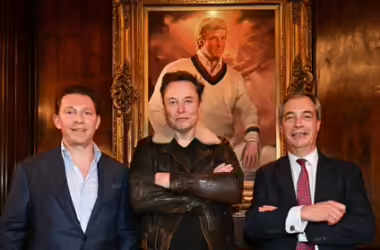Germany’s political firmament has been upended by the Alternative für Deutschland (AfD), which stormed to a historic 20.8% of the vote and 152 Bundestag seats in the snap election of February 23, 2025. Doubling its 2021 tally, the party has vaulted to second place behind Friedrich Merz’s Christian Democratic Union (CDU), which clinched 28.6% and the probable chancellorship. Triggered by the collapse of Olaf Scholz’s fractious coalition in late 2024, the vote laid bare a nation riven by economic discontent and migration fatigue—nowhere more so than in the former East, where the AfD swept all five states, polling nearly one in three votes. Yet internal divisions, an independent geopolitical stance, and its near-certain exclusion from government threaten to sharpen Germany’s already stark divides.
The AfD’s ascent masks a party at odds with itself. A pragmatic faction, led by co-chair Alice Weidel, a former Goldman Sachs economist, jostles with a radical eastern wing under Björn Höcke, a firebrand ex-teacher whose rhetoric has long courted controversy. In Thuringia, where the AfD hit 38%, Höcke’s influence reigns supreme—his 2017 call for a “180-degree turn” in Germany’s memory culture prompted legal scrutiny. Policy rifts abound: moderates advocate trimming EU ties, perhaps ditching the euro, while radicals demand a “Dexit” referendum. On Russia, the AfD breaks sharply from the European mainstream. It seeks normalised relations with Moscow, an end to Ukraine aid—costing Germany €22 billion since 2022, per the Kiel Institute—and even questions NATO’s utility. Weidel has labelled the alliance a Cold War relic, while Höcke’s 2024 meeting with Dmitry Medvedev underscored the party’s Kremlin flirtations. This jars with the European Commission’s steely resolve under Ursula von der Leyen, who has rallied €50 billion for Kyiv and tightened sanctions, eyeing Russia as a systemic threat. The AfD’s Eurosceptic, pro-Russia tilt fuels its outsider cachet but renders it radioactive to potential partners.
Coalition arithmetic offers little hope for the AfD’s inclusion. Merz, poised to helm Europe’s largest economy, has reaffirmed the “Brandmauer”—a firewall shunningAfD cooperation—despite a wobble in January 2025, when he backed a migration bill alongside the party, only to retreat after backlash from within his own ranks and beyond. The Social Democrats (SPD), limping to 15.5% under Lars Klingbeil, and the Greens, at 11.9% with Annalena Baerbock, have doubled down on rejection—SPD’s Katja Mast dubbed Merz “untrustworthy” for his dalliance. The Free Democrats (FDP), ousted from parliament with a dismal 4.8%, leave Merz with slim pickings: a grand coalition with the SPD, a repeat of the Merkel era’s uneasy truce, or a “black-green-red” pact with the SPD and Greens, a configuration tested in states like Bremen but fraught with tension over climate and fiscal policy. The AfD’s 152 seats, while a record, fall far short of the 316 needed for a majority in the 630-seat chamber. Even Sahra Wagenknecht’s BSW, a leftist splinter polling 6.1% with its own pro-Russia leanings, recoils from the AfD’s taint. Short of a political earthquake, the party faces another term barking from the opposition benches.
Exclusion, however, could turbocharge Germany’s polarisation. The east-west schism remains glaring: eastern median wages stagnate at €3,013 monthly against €3,655 in the west, per 2024 federal stats, while unemployment in Saxony hovers at 6.5% versus Bavaria’s 3.2%. The AfD’s eastern sweep— bolstered by 2 million converted non-voters and a 28% share among 18- to 24-year-old men, per exit polls—reflects a region chafing at Berlin’s priorities. Locking the party out risks amplifying its martyr narrative, especially as state funding swells from €10 million in 2024 to an estimated €25 million, powering its propaganda machine. A shaky CDU-led coalition, strained by disputes over the debt brake—capping deficits at 0.35% of GDP—or Ukraine support, could gift the AfD further gains; polls suggest it might nudge past 25% by 2029 if discontent festers. The BSW’s rise, blending anti-war sentiment with welfare populism, might fragment the protest vote but deepen societal trenches.
Europe feels the tremors. Hungary’s Viktor Orbán toasted the AfD’s haul, snubbing Merz, while France’s Marine Le Pen and Britain’s Nigel Farage eye a populist domino effect. Germany’s Jewish community, via Josef Schuster, voiced alarm at the far-right’s scale, a sentiment echoed in Brussels, where von der Leyen braces for a less pliant Berlin. Across the Atlantic, Elon Musk’s X pronouncements—predicting an AfD triumph—and JD Vance’s Munich powwow with Weidel irk Merz, who seeks a Europe less tethered to a mercurial Washington, especially as Trump mulls tariffs. As coalition talks kick off, Germany teeters between pragmatic stitching and a slide into deeper discord.




